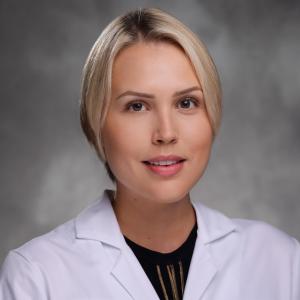
Shelby Davis-Cooper, MD
Program:
Start Year:
2023
Why did you choose Duke for your residency training?
All of the reasons, though here are a few: the caliber of the training, the breadth of opportunities available to residents here, the culture, the people and the relative ease and cost of living in Durham. I fell in love with maternal-fetal medicine and urogynecology on my fourth year sub-internships and knew I wanted to train at an institution where I wouldn’t be limited in my exposure to obstetrics or gynecology. I also wanted to retain the possibility of being a generalist knowing that I would graduate a highly competent clinician and confident surgeon if I ultimately chose that route. I got a strong sense from current residents and graduates of the program that they felt supported — and had access to incredible opportunities and resources— in the many varied paths they wanted to pursue.
Culture was also a major factor in my rank list. Residency is tough and ob/gyn residency is particularly tough. It was important to me to train at an institution where residents had given birth or raised children during residency. Not because I necessarily want that for myself, but for what it signals about a program: that it values and supports trainees in their full humanity, in- and outside the hospital. That is absolutely the case for Duke. Duke’s call schedule also struck me as particularly humane. And that so many people stick around after their training — that was huge.
Finally, I applied to residency the summer Roe v. Wade was overturned and it was deeply important to me to match at a program that valued my efforts and passion for abortion advocacy. Despite the obstacles we face politically in North Carolina, I continue to feel the full weight of my program’s support in my desire to provide comprehensive, evidence-based reproductive health care to my patients.
What excites you about the residency program at Duke Ob/Gyn?
You really do get the sense being here that the world is your oyster. I’m excited to fully lean into each of my rotations and continue to sharpen my sense of what most excites me clinically and surgically.
I’m also excited to train in a program where I feel so psychologically safe! The faculty and leadership in this program are deeply kind, accessible people. It’s incredible how that cultivates a strong culture of learning: I’m not afraid to ask questions, and in being able to ask questions freely I’m every day becoming a better ob/gyn to my current and future patients.
What are your career goals?
If my above responses were any indication, it’s tough to say for certain, though I’m confident it will involve advocacy in some capacity — and likely in an academic setting. I had an incredible opportunity as a fourth-year medical student to rotate on maternal-fetal medicine at a major academic center where MFMs also performed abortions. That was as close to me as a dream career as I’ve come.
I love academic medicine because it requires you to understand the evidence undergirding your practice. You can’t rely on dogma. That’s particularly tough and exciting in a field like MFM, where the research is ever-evolving and often done on a relatively small pool of patients. I also love teaching and working with trainees: teaching for how it demands your full understanding of the subject at hand, and working with trainees because it's an area where you can function to shape the future of medicine. As the first person in my family to go into medicine, I’m indebted to the teachers and mentors who have supported me throughout my educational and professional journey. It’s profoundly important to me to pay that forward.
Describe your research interests/goals:
I am broadly interested in research that improves access to and quality of care for marginalized patients, including low-income and LGBTQ patients and patients of color.
What are your hobbies?
Reading (fiction, poetry and sociocultural theory, in particular), personal essay writing, Peloton-ing and watching virtually anything HBO produces.
Education & Training
Undergraduate school & graduation year:
Yale University, 2014
Medical school & graduation year:
Georgetown University School of Medicine, 2023
Awards & Honors
2023 Raymond T. Holden Award for Outstanding Academic Performance in Obstetrics & Gynecology
2023 Racial Justice Advocacy Award
2023 Gold Humanism Honor Society Inductee
Publications
Shaaya, E.A., & Pollack, S.F., & Boronat, S. & Davis-Cooper, S., & Zella, G.C., & Thibert, R.L.. (2015, Mar). Gastrointestinal problems in 15q duplication syndrome. European Journal of Medical Genetics, 58(3), 191-193. Cited in PubMed; PMID: 25573720.
Presentations
Glowacki, E., & Arora, A., & Asilnejad, B., & Bharil, S., & Davis-Cooper, S., & Elsouri, M., & Hogan, A., & Kim, E.. (2020, April 17). Shortcomings of Existing Policy Implementation in Response to COVID-19 [Poster presented]. AMSA 2020 National Convention/Washington, DC, USA.
Davis-Cooper, S. (2012, August 09). Clinical Experiences in Patients with Duplications of Chromosome 15q [Oral Presentation]. 2012 Dup15q Scientific Meeting/Boston, MA, USA.